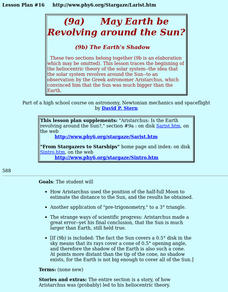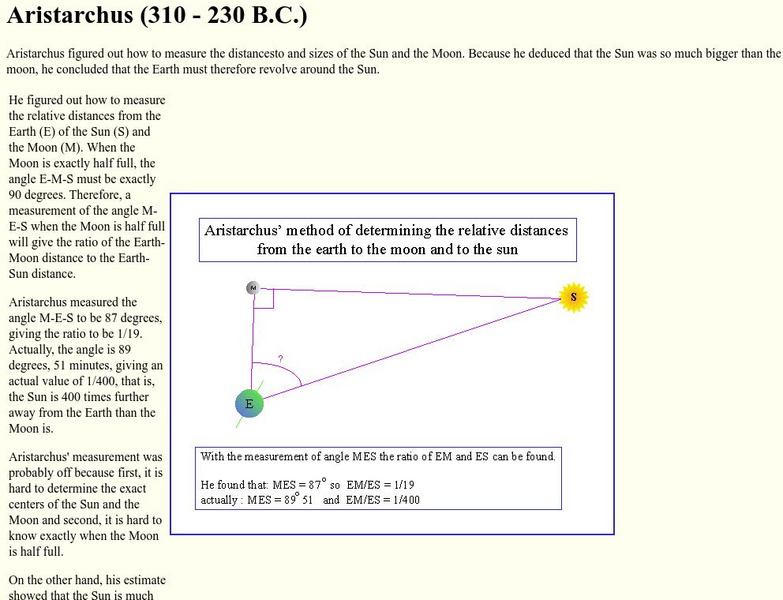Curated OER
The Scientific Revolution: 1500's New Theories and Experimentation
It wasn't called the Age of Enlightenment for nothing. Covered here is a basic overview of the main players and innovative thinking that led to the spread of the scientific revolution. Upper graders will learn about Galileo, Heliocentric...
Curated OER
Scientific Revolution
In this scientific revolution study guide worksheet, students respond to 14 short answer questions. The questions correlate to assigned readings in a textbook.
Curated OER
The Discovery of the Solar System
Pupils study the ideas behind the heliocentric theory of Copernicus. They examine about retrograde motion of the planets as they move around the sun. They study astronomers who include Ptolemy, Copernicus, and Galileo.
Curated OER
May The Earth Be Revolving Around The Sun?
Students trace the beginning of the heliocentric theory of the solar system--the idea that the solar system revolves around the Sun--to an observation by the Greek astronomer Aristarchus, which convinced him that the Sun was much bigger...
University of Oregon
University of Oregon: Greek Science: Early Cosmology
Discusses the evolution of ideas about the cosmos, from the Magic Cosmology of the Neolithic age to the stage of Mythical Cosmology, to the Geometric Cosmology of the ancient Greeks. The third stage advocated a rational approach to...
PBS
Pbs Learning Media: Galileo: Sun Centered System
In the early 1600s, most people believed that the Sun revolved around a stationary Earth. This video segment adapted from NOVA tells how Galileo proved that the Sun, not Earth, is at the center of our universe.
Florida State University
Florida State University: Science, Optics & You: Nicolaus Copernicus
Biography of Nicolaus Copernicus (1473-1543), the scientist who first put forward the theory that the Sun was the center of the universe.
Florida State University
Florida State University: Science, Optics & You: Galileo Galilei
Biography of Galileo Galilei (1564-1642), one of the most famous scientists and inventors of all time. He is best remembered for his invention of the telescope, which caused him to question the contemporary belief that the Earth was the...
Other
University of Zagreb: Nicolaus Copernicus
An interesting biography of Nicolaus Copernicus, the famous astronomer.
University of St. Andrews (UK)
University of St. Andrews: Aristarchus of Samos
This site gives an extensive discussion of Aristarchus' accomplishments in determining the size of the sun and moon and in proposing a sun-centered universe.
Nine Planets
The Nine Planets: Venus
In-depth information site on Venus, complete with a thorough glossary, links to a wide array of related sites, thumbnail picture files linked to larger images, and even a short audio file from a classic symphony.
Cornell University
Cornell University: Astronomy: Aristarchus
This site from Cornell University provides a discussion of how Aristarchus arrived at his conclusions of the distance from the Earth to the Sun and Moon. Also has his methods for determining the size of the Moon and the Sun.











